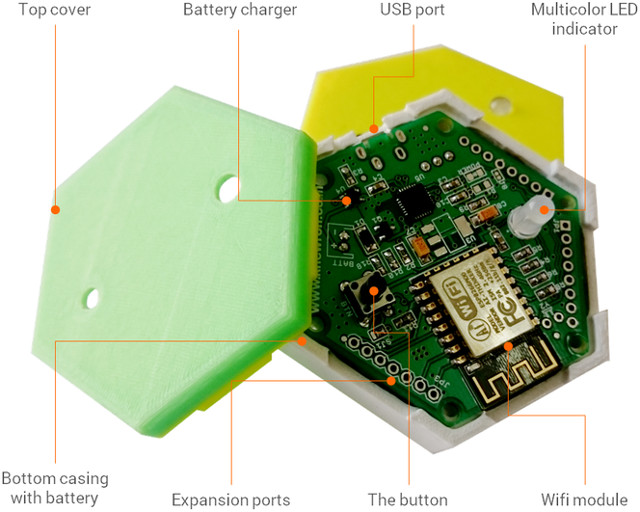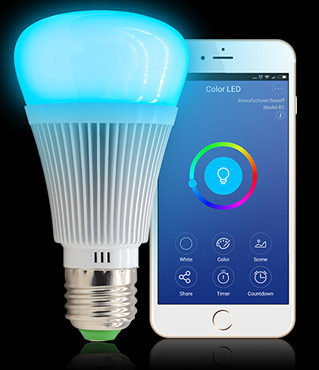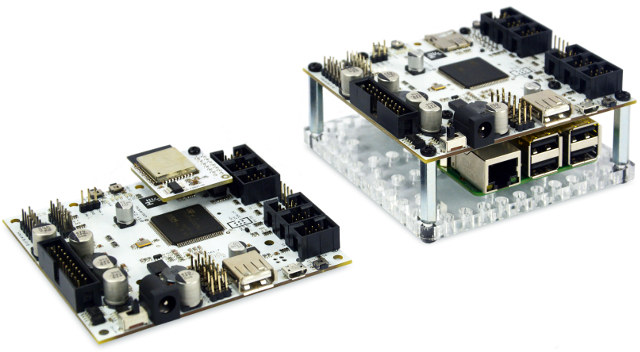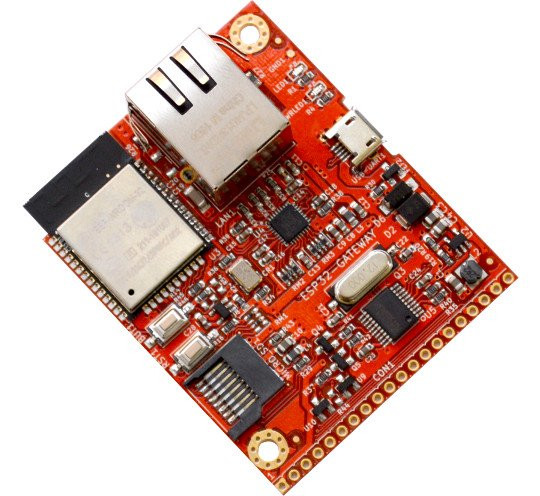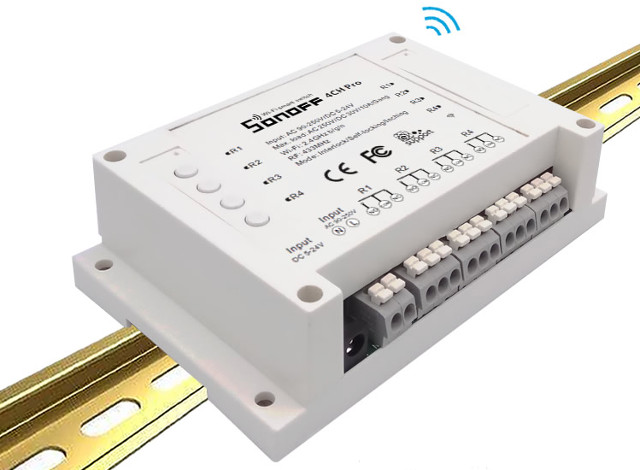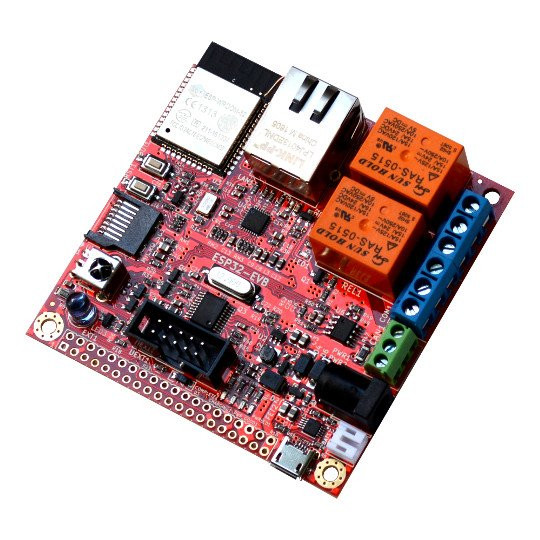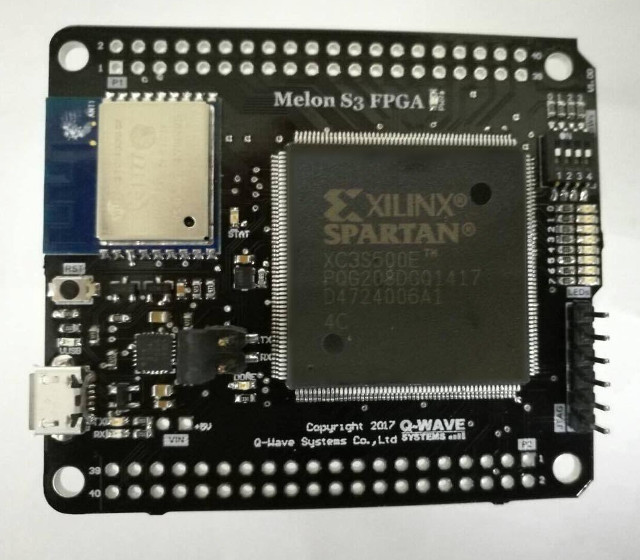If you have some WiFi power switch like Sonoff TH16 at home, you’d normally control them using a mobile app or a web interface. This is all good, but getting your phone, unlocking it, and launching the app to turn on or off an appliance is not the most efficient way to operate, and in some cases, some people in the household may not know how to use a smartphone. Physical WiFi buttons are the solution, but there aren’t so many for sale. We’ve seen previously it was possible to hack an Amazon Dash, but it’s not really that flexible, and 1btn could potentially be a better option, as it’s open source and based on Espressif ESP8266 WiSoC. 1btn specifications: WiFi Module – ESP-12F based on Espressif ESP8266 MCU – Microchip Atmel ATmegaxx8 AVR MCU Connectivity – 802.11 b/g/b WiFi up to ~50 meter range USB – 1x USB port […]
Sonoff B1 is an $18 Hackable WiFi RGB LED E27 Light Bulb based on ESP8285 WiSoC
Earlier this year, I wrote about an ESP8266 based RGB LED “AI Light” lightbulb that was hacked to run ESPurna open source firmware. That’s all good, except some people tried to get one, and ended with a different hardware. So if you’d like something that’s more of a “sure thing”, ITEAD Studio has designed Sonoff B1 dimmable RGB LED E27 light bulb based on ESP8285 processor, and with a “4 pads” to allow for custom firmware flashing. Sonoff B1 hardware specifications: Typical Lumen Output – 600lm Beam Angle – 120 degrees typ. Color Temperature – 2800K-6500K & RGB full color Connectivity – WiFi 802.11 b/g/n @ 2.4GHz Power Supply – 90-260V AC 50/60Hz via E27 base Power Consumption – Light off: 0.5W Max; rated power: 6W Temperature Range – Operating: 0ºC~ 40ºC; storage: -20ºC~ 80ºC Operating Humidity – 5%-90% RH Sonoff B1 with stock firmware can be controlled using the […]
Husarion CORE2 STM32 Board for Robotics Projects Works with ESP32, Raspberry Pi 3, or ASUS Tinkerboard
Husarion CORE2 is a board designed to make robotics projects simpler and faster to complete with pre-configured software and online management. Projects can start using LEGOs, before moving to 3D printed or laser-cut version of the mechanical parts without having to spend too much time on the electronics and software part of the project. Two versions of the board are available: CORE2 combining STM32 MCU with ESP32 WiFI & Bluetooth module, and CORE2-ROS with STM32 instead coupled to a Raspberry Pi 3 or ASUS Tinkerboard running ROS (Robot Operating System). Both solutions share most of the same specifications: MCU -STMicro STM32F4 ARM CORTEX-M4 MCU @ 168 MHz with 192 kB RAM, 1 MB Flash External Storage – 1x micro SD slot USB – 1x USB 2.0 host port with 1A charging capability; 1x micro USB port for debugging and programming via FTDI chip Expansion Headers hRPi expansion header for CORE2-ROS […]
GR-LYCHEE Development Board to Combine Renesas RZ/A1LU Processor, ESP32 Module, and a VGA Camera
Japanese semiconductor vendors have mostly stayed away from the maker market, at least outside Japan, as most people would be hard-pressed to come up with a hobbyist development board powered by processor or micro-controller from Toshiba, Sony, Renesas or other Japanese companies, despite the three aforementioned names being in the top 20 semiconductors companies. I can only remember having written about Fujitsu F-Cue 96Boards, as well as Renesas GR-PEACH mbed board since I started this blog 7 years ago. Renesas seems to be the only company to have a real community behind with their “Gadget Renesas” pink-colored development boards, and the latest and seventh board is GR-LYCHEE powered by Renesas RZ/A1LU ARM Cortex-A9 processor, and equipped with a WiFi & Bluetooth module, and a camera. Renesas GR-LYCHEE board preliminary specifications: Micro-processor – Renesas RZ / A1LU (R7S721030VCFP 176-pin QFP) ARM Cortex-A9 Processor @ 384 MHz with 3MB on-chip SRAM Storage […]
Olimex Launches 22 Euros ESP32-GATEWAY Board with Ethernet, WiFi and Bluetooth LE
Olimex has just launched ESP32-GATEWAY board, as cost-down version of their ESP32-EVB board, still with Ethernet, WiFi, and Bleutooth LE, but without any relays, CAN bus, nor IR control, less I/Os, and a smaller footprint. Olimex ESP32-GATEWAY specifications: Wireless Module – ESP32-WROOM32 module with 802.11 b/g/n WiFi and Bluetooth LE Wired Connectivity – 10/100M Ethernet with RJ45 jack (via LAN8710A) External Storage – micro SD slot Expansion – 20-pin GPIO connector USB – 1x micro USB port for debugging (CH340T) and power Misc – Reset and user buttons Power Supply – 5V via micro USB port Dimensions – 62 x 50 mm Another change is the lack of a LiPo charger to run the board from batteries. Just like most Olimex boards, ESP32-GATEWAY is open source hardware with KiCAD design files available on Github. The software directory is still empty, but Ethernet demo code using ESP32-IDF has been pushed for […]
$23 Sonoff 4CH Pro 4-Channels WiFi & RF Switch Ships in a DIN Rail Enclosure
ITEAD Studio’s Sonoff family is a collection of really useful and inexpensive home automation devices which have been featured multiple times on CNX Software with either to stock firmware and eWelink app, or open source firmware developed by the community. I’m using a Sonoff TH16 to control a water pump, a Sonoff Pow to monitor my office’s power consumption, and Karl used some Sonoff switches to control his lights at home. The company has now launched Sonoff 4CH Pro with 4 relays that can be controlled with buttons on the unit, WiFi, or RF remote controls, and comes in a DIN Rail enclosure. Sonoff 4CH Pro switch specifications: Connectivity – ESP8266 WiFi module and 433 MHz receiver Relays – 4x HUIKE 230V/10A relays (max 2200W per relays) with NC and NO connection Configuration – K5 & S6 switch for mode selection; K6 switch for time selection (0.5 to 4s) Misc […]
Olimex ESP32-EVB Board with Ethernet, CAN Bus, and Relays up for Sale for 26 Euros
One of the new feature of Espressif ESP32 SoC over ESP8266 is the inclusion of an Ethernet MAC interface, but so far few boards come with an RJ45 jacks. ESP32 Monster board is an option, also including an OLED Display and CAN Bus, and sold on Tindie for $35, but Olimex has now stocked their ESP32-EVB board with Ethernet, CAN Bus, and two relays, and you can purchase it for 26 Euros per unit, and less in larger quantities. Olimex ESP32-EVB Rev. B specifications: Wireless Module – ESP32-WROOM32 module with 802.11 b/g/n WiFi and Bluetooth LE Wired Connectivity – 10/100M Ethernet with RJ45 jack (via LAN8710A) External Storage – micro SD slot Relays – 2x 10A/250VAC relays with LED status Expansion 40-pin GPIO female header (2.54mm pitch) UEXT connector for sensors and modules CAN Bus USB – 1x micro USB port for debugging (CH340T) and power Misc – Reset and […]
Melon S3 FPGA Arduino & Raspberry Pi Compatible Board is Programmable over WiFi using ESP8266 WiSoC
Q-Wave Systems, an embedded systems company based in Thailand, has designed Melon S3 FPGA board powered by a Xilinx Spartan 3E FPGA with WiFi connectivity added through a ESP8266 module programmable with the Arduino IDE , and featuring two Raspberry Pi compatible headers. The FPGA bitstream can be updated over WiFi, and does not require a JTAG debugger. Melon S3 FPGA specifications: FPGA – Xilinx Spartan XC3S500E FPGA with 500K gates, 73Kb Distributed RAM, 4 Digital Clock Manager (DCM), 20 Multipliers (18×18), 360 Kb Block RAM WiFi module – WROOM-2 with Espressif ESP8266 32-bit MCU @ 80 MHz supporting 802.11 b/g/n WiFi. Storage – 4MB SPI flash in total with 1MB for ESP8266, 3 MB for FPGA Expansion – 2x 40-pin Raspberry Pi compatible headers; 3.3V tolerant Debugging – Onboard USB-UART Silicon Labs CP2104 for configuration, debugging and power; 6-pin JTAG port for debugging/programming Misc – 8x Users LEDs, 4x […]


